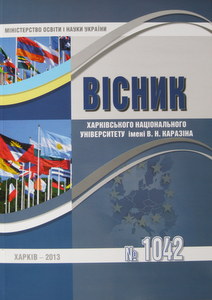Methodical approaches to the analysis of sociocultural factors of international business development
Abstract
The paper deals with the issue of existing methodological approaches to the analysis of socio-cultural factors in the development of international business. The relevance of the study definded by the fact that the international business, going beyond national boundaries, faced with the need to adapt to different social and cultural patterns of countries. Cultural and social differences play a significant role in the development of international business, making a strong impact on the marginal efficiency of business joint ventures. This creates significant cross-cultural issues of international business.
The aim of the article is to examine the existing methods and models of analysis of factors influence the socio-economic processes and the development of methods of analysis of the influence of socio-cultural factors in the development of international business.
On the basis of the research work, the author concludes that it is necessary to conduct a comprehensive analysis on the basis of the use of several methods of factor analysis in order to avoid errors in determining the formation of a standardized approach to the allocation of social and cultural factors that influence the development of international relations and business principles. As a result of the proposed methodical campaign the author formes groups of countries with similar patterns of doing business in international cooperation on the basis of the calculation of socio-cultural distance performance of countriesDownloads
References
Орлов А. И. Математика нечеткости. / А. И. Орлов // Наука и жизнь. –1982. – No.7. – С. 60-67.
Орлов А. И. Организационно-экономическое моделирование : учебник : в 3 ч. / А. И. Орлов. – М. : Изд-во МГТУ им. Н.Э. Баумана, 2011. – 486 с.
Орлов А. И. Теория принятия решений : учебное пособие / А. И. Орлов. – М. : Март, 2004.
Плюта В. Сравнительный многомерный анализ в эконометрическом моделировании / В. Плюта / Пер. с польск. – М. : Финансы и статистика, 1989. – 175 с.
Плюта В. Сравнительный многомерный анализ в экономических исследованиях: методы таксономии и факторного анализа / В. Плюта. – М. : Статистика, 1980. – 151 с.
Портер М. Курс МВА по стратегическому менеджменту / М. Портер, Дж. Самплер, С.К. Прахалад и др. – М, Альпина, 2002. – С. 311-316.
Радулов Д. Д. Применение таксономического метода для оценки влияния внешних факторов конкурентоспособности предприятия / Д. Д. Радулов // Бизнес Информ. – 2014. – № 2. – С. 293 – 299.
Раєвнєва О. В. Управління розвитком підприємства : методологія, механізми, моделі : монографія / О. В. Раєвнєва. – Х. : ВД «ІНЖЕК», 2006. – 496 с.
Решетняк Е. И. Методы многомерного сравнительного анализа при оценке конкурентоспособности предприятия / Е. И. Решетняк, Р. О. Лободин // Бизнес Информ. – 2016. – №9. – C. 100–105.
Саблина Н. В. Использование метода таксономии для анализа внутреннего ресурса предприятия / Н. В. Саблина, В. А. Теличко // Бизнес Информ. – 2009. – № 3. – С. 78 – 82.
Скороспелов Д. Нечеткие множества для нечетких выводов / Д. Скороспелов // Управление компанией. – 2005. – № 5.
Терехова Ю. О. Оценка конкурентоспособности и качества функционирования региональных предприятий / Ю. О. Терехова [Электронный ресурс]. – Режим доступа : http://vernadsky.tstu.ru/pdf/2009/02/rus_32.pdf
Тромпенаарс Ф. Национально-культурные различия в контексте глобального бизнеса / Ф. Тромпенаарс. Ч. Хемпден-Тернер; пер. с англ. Е. П. Самсонова – Мн. : Попурри, 2004. – 528 с.
Янковой А. Г. Многомерный анализ в системе STATISTICA / А. Г. Янковой. – Одесса : Оптимум. 2001. – Вып. 1. – 216 с.
Hofstede G. Culture’s Consequences, International Differences in Work-Related Values. Beverly Hill : Sage, 2001. – 459 p.
Authors who publish with this journal agree to the following terms:
- Authors retain copyright and grant the journal right of first publication of this work under the terms of a license Creative Commons Attribution License 4.0 International (CC BY 4.0).
- Authors are able to enter into separate, additional contractual arrangements for the non-exclusive distribution of the journal's published version of the work (e.g., post it to an institutional repository or publish it in a book), with an acknowledgement of its initial publication in this journal.
- Authors are permitted and encouraged to post their work online (e.g., in institutional repositories or on their website) prior to and during the submission process, as it can lead to productive exchanges, as well as earlier and greater citation of published work.




